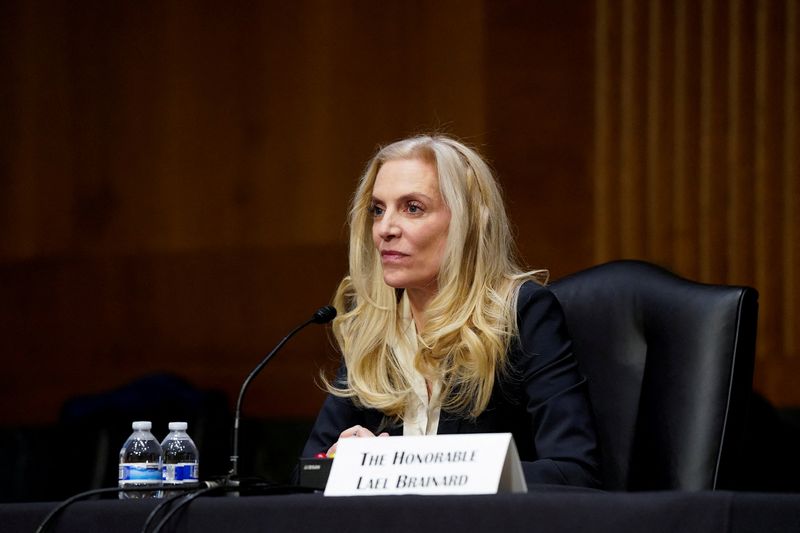
© Reuters. FILE PHOTO: Federal Reserve Board Governor Lael Brainard testifies before a Senate Banking Committee hearing on her nomination to be vice-chair of the Federal Reserve, on Capitol Hill in Washington, U.S., January 13, 2022. REUTERS/Elizabeth Frantz/File Ph
By David Morgan
(Reuters) -Federal Reserve Governor Lael Brainard won confirmation in the U.S. Senate on Tuesday to be the U.S. central bank’s next vice chair, a week ahead of a key Fed meeting where policymakers are expected to ramp up their battle against inflation with a big interest-rate hike and the start of a balance sheet reduction.
The vote was 52-43 as several Republicans joined Democrats to meet the 51-vote minimum for confirmation, the first of U.S. President Joe Biden’s four Fed nominees to clear that hurdle.
But Republicans blocked progress for a second Fed nominee, Michigan State University’s Lisa Cook, who would be the first Black woman to serve on the Fed’s Board since the central bank’s founding in 1913.
Two Democrats and Senate tie-breaker Vice President Kamala Harris reported testing positive for COVID-19 on Tuesday.
That left Biden’s party without the requisite numbers on Tuesday to overcome unified Republican opposition to Cook in the evenly divided Senate.
OTHER FED NOMINEES
Biden’s two other Fed nominees do have bipartisan support: Fed Chair Jerome Powell, renominated to his current position, and Davidson College dean of faculty Philip Jefferson, nominated to a vacant seat on the Board.
But on Tuesday lawmakers failed to agree on a date to hold those confirmation votes.
Banking Committee Chair Sherrod Brown said they would circle back to a vote on Cook once the quarantining Democrats return. After Tuesday’s 47-51 vote on Cook, Senate Leader Chuck Schumer entered a motion to reconsider Cook’s nomination that will make a future confirmation attempt possible.
For now, the partisan deadlock will not impact Fed action.
Powell remains in charge of Fed monetary policy and the central bank, and with Brainard as his deputy, is expected to lead the U.S. central bank in lifting interest rates to at least 2.5% by the end of this year, up from a range of 0.25% to 0.5% now.
But even after the newcomers join, the Fed is unlikely to change course. At their confirmation hearings earlier this year, both Jefferson and Cook noted the economic harms of too-high inflation.
Since then, inflation has soared further and the Fed has taken a more aggressive posture.
Biden plans to fill the last of the Fed Board’s seven seats by nominating former Treasury official Michael Barr to be the Fed’s vice chair of supervision.
Barr’s paperwork is expected to be submitted this week and the White House hopes to have him confirmed by the end of May, a source familiar said earlier this week.
Sarah Bloom Raskin, Biden’s initial choice for that job, withdrew her name from consideration last month after Republicans on the Senate banking committee blocked a vote on her appointment and a key Senate Democrat signaled he would not support her.
Source: Investing.com



























